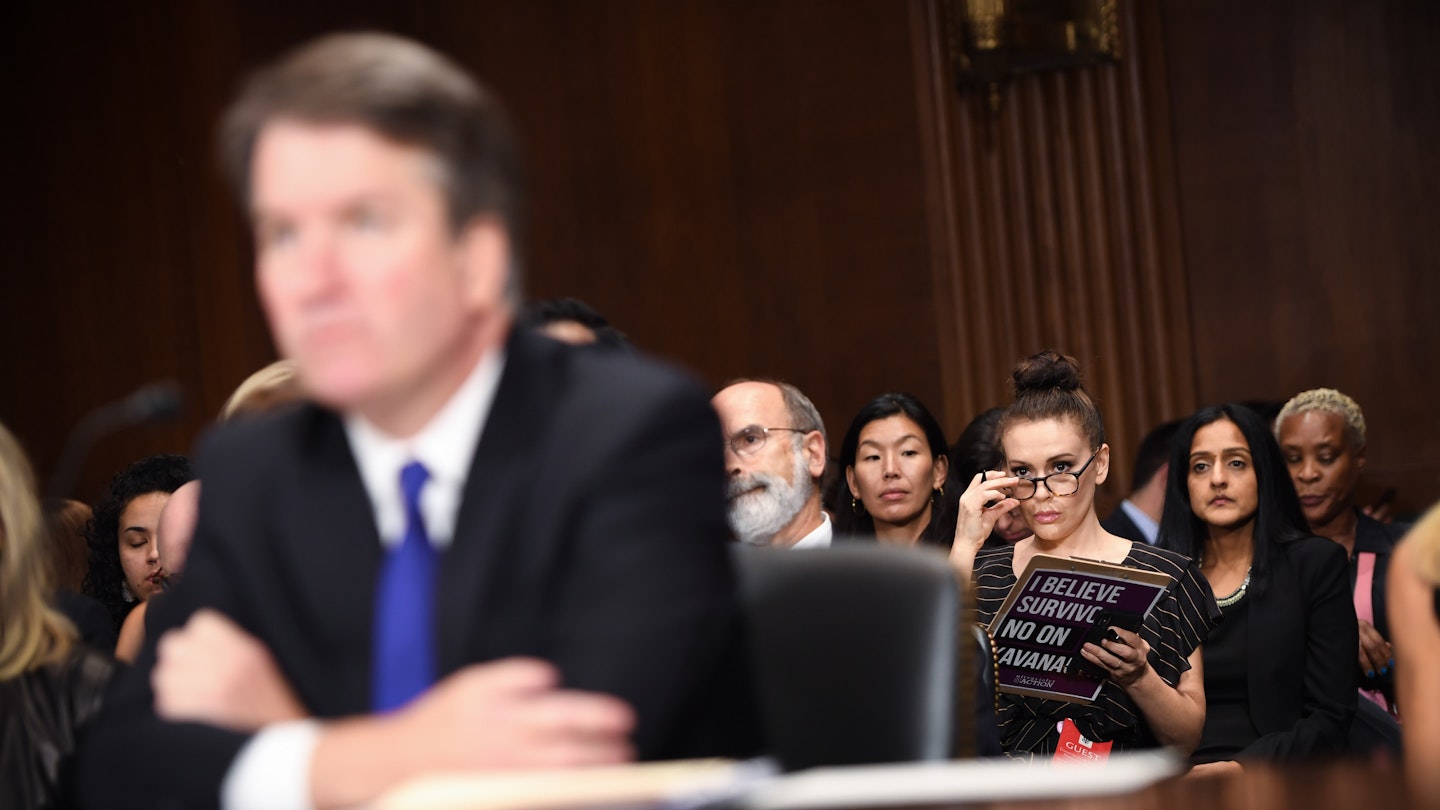US Supreme Court nominee Brett Kavanugh currently stands accused of sexual assault by not one, not two, not three but four women. He denies all of the allegations.
One of them – Professor Christine Blasey Ford is currently in the process of giving her testimony to a Senate panel. She has said the assault she suffered ‘drastically altered my life’.
So far, so horrifically unremarkable. Men in power, accused of assault. Check. Women whose lives were changed fundamentally by it. Check. Shame and stigma. Check.
And then, Donald Trump, who is himself something of an expert when it comes to being accused of sexual misconduct, decided to weigh in via his favourite medium…Twitter.
‘I have no doubt that, if the attack on Dr Ford was as bad as she says, charges would have been immediately filed with local Law Enforcement Authorities by either her or her loving parents’ he tweeted ‘I ask that she bring those filings forward so that we can learn date, time and place!’
There it was…doubting the credibility of a woman who says she has been assaulted. Check.
The President of the United States implicitly condoned all of the rape myths and misinformation that undermine women’s credibility, chipping away at our right to occupy space in the world, every single day. He confirmed what many people think privately – that women would report rape if it actually happened, if they were upset enough, if it mattered to them enough.
We know this is a myth – a carefully crafted fantasy designed to further enhance self-blame and encourage women to stay silent by binding us together in shame. But Donald Trump doesn’t care much for ‘the facts’ – does he?
As it so often does right now, women’s anger and outrage flew around on the Internet, razor sharp and coming together through the #WhyIDidn’tReport hashtag. There have been hundreds of thousands of tweets. Women, all over the word, refused to allow him to perpetuate these malevolent myths.
The tweets are upsetting to read. It’s also tiring to read them. So many of us are saying the same thing, over and over and over again – ‘I didn’t know if I would be believed’. The statistics back us up: one in five women in England and Wales has experienced some form of sexual violence since the age of 16, but for some reason they are always overlooked.
The hackneyed story of rape itself, as we are so often told it, is part of Trump’s mythology. The very word ‘rape’ conjures up film noir images of a stranger attacking a woman in a dark alleyway. Ironically, just as this standard story of rape feels worn out, tired and unnervingly every day, the experience of it so often is just that. We know the majority of rapes and sexual assaults are committed by someone familiar and, often, occur at home. In the UK, the perpetrator was a stranger in only 10% of rape and serious sexual assault cases. In 56% of cases it was the victim’s partner, and in the remaining 33% it was a friend, an acquaintance, or other family member.
Only this week, it has been made clear that the UK has problems just as big as the US when it comes to sexual violence. The latest figures from the Crown Prosecution Service (CPS) show that prosecutions for rape have dropped by 23 per cent over the last year. The CPS took on fewer rape cases for the fourth year in a row, partly because fewer cases were referred by Police .
Meanwhile, the Guardian’s Alexandra Topping revealed that police are demanding ‘almost unfettered access to highly personal records and data from potential rape victims.’ Rape Crisis have said that the ‘extraordinary level’ of data being seized from those who report rape is ‘causing increased stress and anxiety among survivors’.
Of course it is. It is yet another reminder, like Trump’s tweet, for women everywhere that even when we do report assault, we might not be believed.
Conversations about power and assault erupted with #MeToo. Women’s stories had been stored like hot lava in the chambers of a dormant volcano waiting to erupt. And now, they keep coming. Increasingly, we find we are not bound together by shame and silence but by the stories we have in common about the way we were mistreated.
In the wake of this rupture, women are refusing to be co-opted into the old stories any more. We are thinking back to our own experiences, the experiences of our friends and wondering about the experiences of our mothers and grandmothers. We’re taking the conversations we may have had, in whispers, over dinner and taking them online. We’re asking ourselves, what would I do if I was in Professor Ford’s position? If the man who assaulted me was about to become one of the most powerful people in my country?
We must keep them going because for every #WhyIDidn’t report story, there will be a woman who feels she has no point but to stay quiet and deal with her trauma alone because she fears she might not be believed if she speaks out
